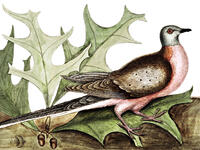
The two talks described below are part of a series of webinar talks focused on the theme of “Mass Extinction: Art, Ritual, Story, and the Sacred”, part of the broader Religion, Ecology, and Expressive Culture Initiative at the Yale Institute of Sacred Music. Register here.
Making Extinction Human in the Anthropocene by Sadiah Qureshi
Extinction might be a natural process, but it is also how humans make sense of a world they’re changing in unprecedented ways. This talk will explore some of the ways humans have contributed to developing ideas of extinction, but also creating meanings from extinction that have contributed to empire and dispossession with important consequences for addressing historical injustice in the present day.
Sadiah Qureshi is a historian of race, science, and empire and is currently writing a history of extinction for Penguin Random House. Her previous book, Peoples on Parade (2011), explored the importance of displayed people for the remaking of race and anthropology in the nineteenth century. She cannot bear the thought of living in a world without tigers.
Two Sparrows Falling: Imagining Avian Exhaustion by Nancy Menning
The Noah’s Ark myth, a tale of rising seas and catastrophic loss of life, is ever present as we ponder ongoing climate collapse and mass extinctions. This presentation enters imaginatively into the early days of the Genesis flood, refracted through our current environmental crisis. How might the humans on the Ark have borne witness to the chaos, mourned their losses, and acted to secure the future?
Nancy Menning is an independent scholar committed to enlivening the religious imagination. She writes on climate collapse and species extinctions through the lens of Noah’s Ark. Dr. Menning lives in the traditional homelands of the Kalapuya people in the Willamette River watershed of western Oregon, where she donates time to land restoration activities and joins with others to imagine decolonized futures.